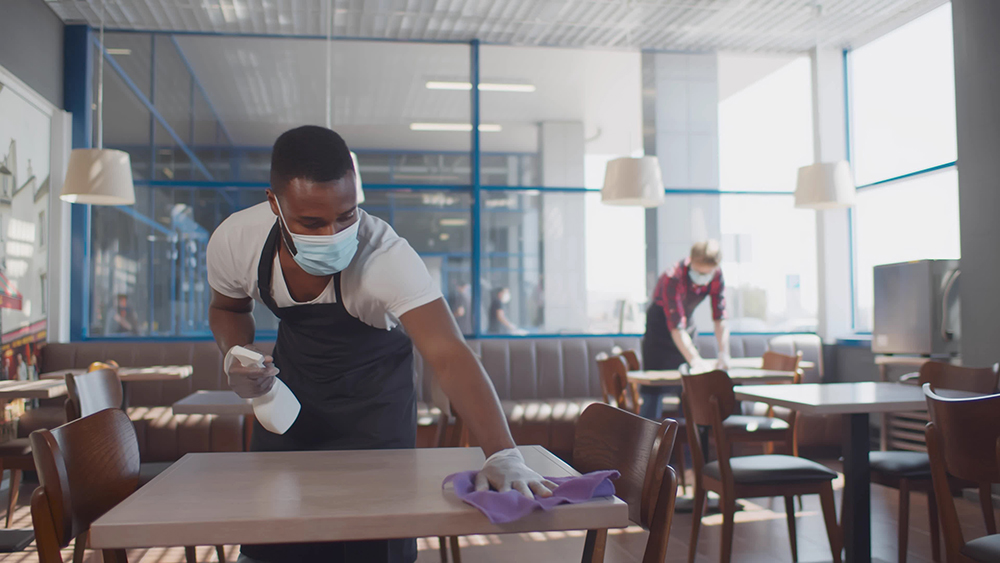The struggle is real, folks. It’s safe to say no business has been left unaffected by the ongoing COVID-19 pandemic. From big box brick and mortar to mom-n-pop shops, everyone has had to rethink operations and refocus priorities. Thus far, 2020 has proven that not necessarily ‘only the strong will survive,’ but more like ‘the resilient’, ‘the creative’, and maybe even ‘the crazy.’
In the early months of lockdown, everyone turned their attention to small business. Often considered the backbone of our economy, we worried about our hometown restaurants, our main street stores and our neighborhood services.
But while the stock on plexiglass rose, local businesses were busy hitting the pavement. Restaurants quickly streamlined takeout processes and boasted contactless delivery. Retailers scrambled to ramp up websites for online ordering and curbside pick-up. Establishments dialed back on open hours, maybe even choosing to close temporarily. Cleaning procedures were made public. Communication from local shops on social media became more heartfelt to endear themselves to customers. “We’re all in this together” became the isolation battle cry.
After a weathered spring, the U.S. Chamber of Commerce’s July survey of 500 small business owners across the continental United States, Alaska and Hawaii found that 86% reported being fully or partially open. Good news. However, Yelp also keeps up on the statistics. In September, they reported 60% of businesses that closed as a result of the pandemic won’t be reopening. The numbers feel at once optimistic and disappointing. The dichotomy is telltale of a year spent longing to put our money, literally and metaphorically, on something promising.
All this economic wavering certainly puts a hitch in the entrepreneur’s get-along. Sure, keeping the doors open on an existing business continues to prove challenging. But what about businesses with ribbon-cutting plans during the early half of 2020?
Tracy Watson of Off the Wall, a custom frame shop in Christiansburg, planned for months to open at the beginning of the year. By March 24 her doors were locked, not knowing when she would be able to reopen.
“It was a frustrating and sad decision. Business was picking up, people were finding me, I was finding my rhythm and having fun. But I felt a responsibly to not be the reason someone got sick,” Watson states. She applied for the Emergency Injury Disaster Loan (EIDL) through the Small Business Administration, but they wanted 12 months of records, which she didn’t have as a weeks-old business. The Paycheck Protection Program (PPP) also didn’t apply because Watson doesn’t have any employees.
“I had been building this shop in my head, on paper, and eventually in reality for too long to give up easily. Personally and business-wise, I have shifted my focus from a year of amazing growth to a year of steady survival.”
Jay Balser, owner of CoachClean of Christiansburg, launched his new green cleaning business in July. Opening during a pandemic, he relates, made him work harder to make sure he did everything right. His growth has been non-stop, which he attributes entirely to the local network.
“We are so blessed that the community has been so supportive. I know we are making a difference for people. We are providing a service that not only keeps things clean but we are also helping people stay safe,” Balser offers.
Kim Lovern of Pembroke’s Salon Lou opened her business because of the pandemic. A hair stylist for 25 years, Lovern spent her time in quarantine reevaluating her current situation. She wasn’t entirely comfortable with the idea of returning to a busy atmosphere and, having owned a salon many years prior, she had an understanding of what it would take to do so again. When a fully renovated space in Pembroke crossed her path, the opportunity was too destined to pass up.
“It really wasn’t about just my mental health or my safety being around a large number of people throughout my day and week. It was about my clients and how they were feeling coming back into a salon atmosphere with other stylists and clients around. It was so important to me to provide them with a clean, safe and comfortable environment,” Lovern adds.
Like all of us, Lovern hopes the end of the pandemic happens sooner than later, but until then: “My plan moving forward is to keep doing what I am doing and continue to stay on top of cleaning and sanitizing my space after each client and not get relaxed in doing so.”
Those pesky numbers tell us the future remains uncertain. Sixty-five percent of small businesses continue to worry they will not be around by the end of 2020, especially when whisperings of a second wave haunt the airwaves. Maybe the key to sanity is in staying hyper-focused on our own backyards. Goodness knows we’ve spent enough time in them this year.
“I am here for the community as much as they are here for me,” Balser concludes.
Keeping tabs on the national scene is overwhelming, but if we continue to put energy into the people and businesses of our towns and neighborhoods, we will make a positive difference. If our hopes stay high, the future may actually be so bright we’ll need to pick up a new pair of shades from the local five-and-ten.
Text by Nancy S. Moseley
Nancy S. Moseley is a writer from Blacksburg and believes that there is no better time than now to “Shop Local.”

